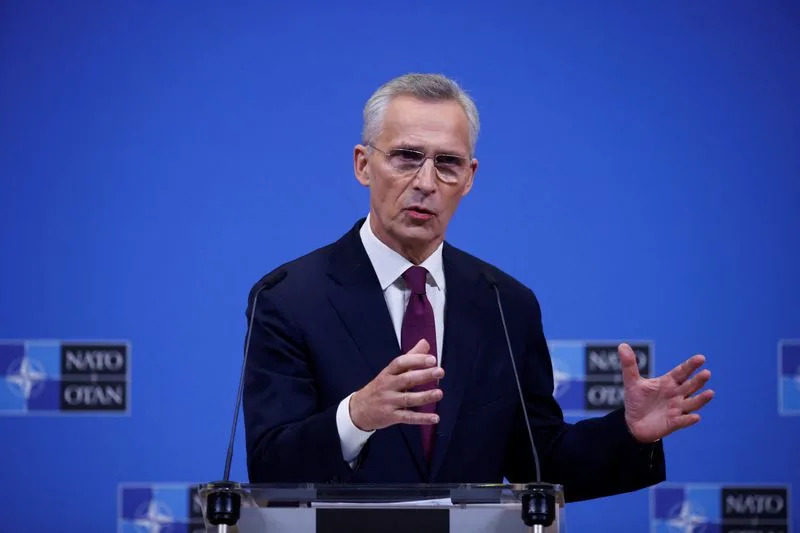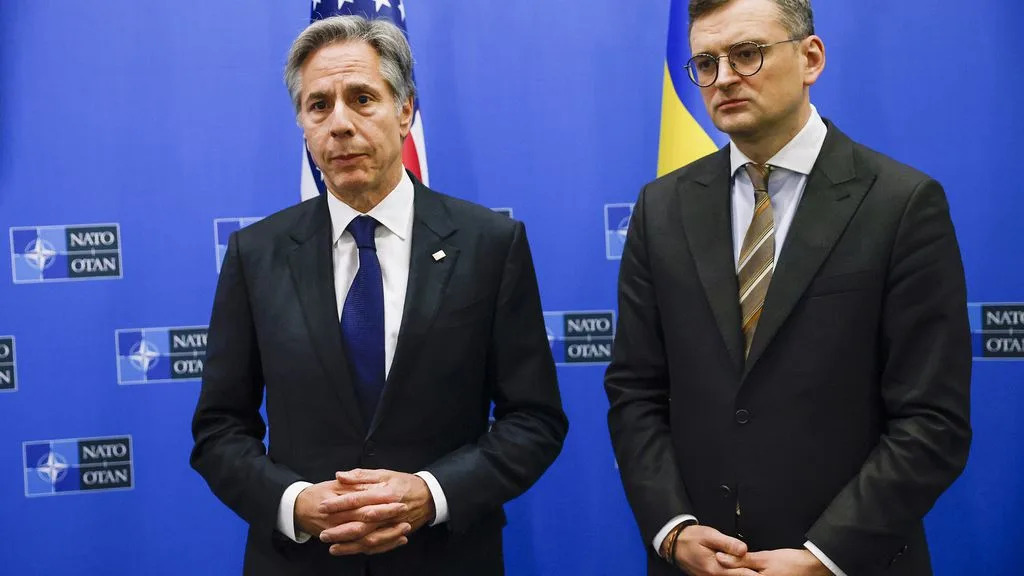Comments by NATO Secretary General Jens Stoltenberg about expulsions of Russians from NATO headquarters referred to incidents from recent years, not recent months, as originally reported by German daily Bild, the alliance said on Friday.
NATO Secretary General Stoltenberg attends a press conference, at the NATO Headquarters in Brussels.
Bild also issued a correction to its report, clarifying that Stoltenberg had not mentioned a timeframe when talking about the expulsions in an interview with the German outlet.
"Russia suspended its mission to NATO in October 2021. In an interview with Bild this week, the Secretary General referred to steps taken over recent years," a NATO official said.
In the interview, Stoltenberg said: "We have seen that Russian intelligence services have operated across European countries for many years. We’re also seeing attempts to step up their activities but of course, NATO allies are monitoring, following this very closely."
He said NATO "expelled, for instance, Russian personnel from NATO headquarters because we realized that they were carrying out activities that were not actually diplomatic work, but intelligence work."
In October 2021, NATO said it had expelled eight members of Russia's mission to the alliance who were "undeclared Russian intelligence officers".
State of the Union: NATO's birthday and corruption in Europe
State of the Union: NATO's birthday and corruption in Europe
We had a big birthday party in town this week: NATO marked its 75th anniversary.
There will be a real celebration in Washington in the summer, but the event was deemed so important that top officials came to Brussels for the occasion – and for a small party.
And there was one special guest who traveled all the way from the archives of the US government to NATO headquarters: the original North Atlantic treaty.
A historic document that solidified 75 years of collective defense across Europe and North America.
The anniversary came as the alliance discussed plans to provide more predictable longer-term military support to Ukraine.
"We need to shift the dynamics of our support," said NATO Secretary General Jens Stoltenberg.
"We must ensure reliable and predictable security assistance to Ukraine for the long haul. So that we rely less on voluntary contributions and more on NATO commitments. Less on short-term offers and more on multi-year pledges.”
At the NATO meeting, participants also discussed Russia’s aggressive behaviour in terms of hybrid warfare – directed not only against Ukraine, but against the European peace order in general.
Vladimir Putin, Germany’s foreign minister Annalena Baerbock said, aims to undermine and erode democracies in Europe from within: “We must not be naive there either. What we have seen in recent years was not a coincidence, but targeted destabilisation in various European countries, with disinformation and cyber-attacks.”
The reason why she went after Putin is a brewing scandal known in early reports as “Russiagate”.
Politicians from several EU countries stand accused of being bribed by Moscow to parrot the Kremlin’s talking points.
The idea is to sway EU public opinion ahead of the European elections in June.
A right-wing lawmaker from Germany has allegedly accepted €25,000 to do just this.
If this isn’t textbook corruption...
We spoke to a man who knows a thing or two about corruption, Nicholas Aiossa, director of Transparency International EU.
Euronews: So, if you look at the last term of the European Parliament especially with the so-called Qatargate scandal, has corruption in the EU become a bigger problem than it was before?
Aiossa: I don't think it has become bigger. I think it's become more brazen. I mean, the fact that we have sitting MEPs, ex MEPs and EU staff members, walking around with suitcases of cash, as if they can operate without fear of consequences, is a real problem. And I think that that has become a problem because the institutions haven't taken the necessary reforms, on their ethical and anti-corruption frameworks.
The institutions, particularly the Council, haven't adopted the anti-corruption directive. And the Commission needs to more rigorously use the preventative and punitive tools that they have at their disposal to fight corruption. And until those things happen, I think it will only get worse.
Euronews: On that note, there is still no independent oversight and monitoring of the conduct of members of Parliament – why hasn’t the institution been more serious about reform?
Aiossa: Because I'm afraid that there's been a culture of impunity that has been allowed to fester for decades, that has prevented the necessary reforms in the wake of the scandal. There remains no, as you say, independent oversight on their ethical behaviour. And when there are violations of the rules, there's no sanctions, that are put into place and there's and they're not strong enough to serve as a deterrent. And that culture will unfortunately remain until some of those reforms are put in place.
Euronews: There are obviously huge differences when it comes to corruption in member states. How did that play out over the last five years, has this become a real threat to democracy?
Aiossa: Yes, corruption and the erosion of rule of law is always a threat to democracy. And unfortunately over, I would say, the last ten years we have seen a steady decline in certain member states when it comes to rule of law, and, and the ability to fight corruption. I think one of the main problems, despite some recent improvements, in the toolbox of the Commission being able to tackle this, is that they have been too apprehensive and too skittish about using those tools to address situations in the member states.
Euronews: I'd like to close on a positive note - how confident are you that the political class in Europe has learned its lesson?
Aiossa: I'm not sure if I'm going to be able to give you that positive note, unfortunately. I'm not as confident, and particularly in the last year, than I would want to be at this stage. I just simply don't think that the Parliament at least, understood the gravity of the scandal and the response to it was ultimately weak and meagre. And when it came to the vote, very weak and meagre adjustments to the rules, were ultimately agreed.
They didn't tackle the structural problems when it comes to independent oversight or sanctions. I mean, we still have MEPs that are walking around with very lucrative side jobs with companies that are lobbying the same institutions, and they find this entirely normal. And I think they're doing themselves, and the reputation of the Parliament great harm. And unfortunately, in an election year, there is still perhaps time to turn that around. And I hope they use these next eight weeks to do so.
US Secretary of State Blinken insists 'Ukraine will become a member of NATO'
US Secretary of State Blinken insists 'Ukraine will become a member of NATO'
At a conference to celebrate NATO's 75th anniversary, US Secretary of State Anthony Blinken said Ukraine will join the alliance – and that the purpose of the summit in Brussels was to work toward that membership.
During the meeting, members of the Alliance praised determination and perseverance of Ukrainians and promised to continue to provide aid for the country. Yet Secretary General Jens Stoltenberg reaffirmed that the alliance does not consider itself directly involved in the war.
"We don't have any plans of having any NATO combat troops inside Ukraine," Stoltenberg said. "The Ukrainians are asking for equipment, for ammunition, for weapons, and we are providing that to Ukraine. That doesn't make NATO allies party to the conflict, but we support Ukraine in upholding the right for self-defence."
NATO's top diplomats this week vowed to continue supporting Ukraine as the better-armed Russian troops asserts control on the battlefield.
Plagued by ammunition shortages, Ukraine has lowered the military conscription age from 27 to 25 in an effort to replenish its army's depleted ranks, and is appealing for additional air defences to counter Russian ballistic missile attacks.
“I didn't want to spoil the birthday party for NATO, but I felt compelled to deliver a sobering message on behalf of Ukrainians about the state of Russian air attacks on my country, destroying our energy system, our economy, killing civilians," said Ukrainian Foreign Minister Dmytro Kuleba, who attended a meeting of the NATO-Ukraine Council.
Antony Blinken, speaking before meeting with Kuleba, said that “support for Ukraine, the determination of every country represented here at NATO, remains rock solid.”
“We will do everything we can, allies will do everything that they can, to ensure that Ukraine has what it needs to continue to deal with Russia’s ongoing aggression against Ukraine, aggression that is getting worse with every passing day,” he said.
Early on Friday, new explosions rocked Kharkiv, Ukraine's second-largest city, which has been targeted several times this week, including Thursday night.
NATO chief’s final battle: Protecting Ukraine from Trump, US
NATO Secretary-General Jens Stoltenberg is putting his legacy behind a final push to shore up international support for Ukraine in its fight against Russia.
The secretary-general, who will step down later this year after a decade leading the alliance, is pitching to the 32-NATO member countries a plan to establish a five-year, 100 billion euro fund for Ukraine, and for NATO to assume leadership of the U.S.-led Ramstein group, the monthly gathering of more than 50 countries coordinating weapons deliveries for Kyiv.
The ideas, putting Europe in more of a leading role over its security, are borne out of anxiety that the U.S. may be less reliable as a future partner.
“This is not just Trump-proofing, but U.S.-proofing in some ways,” said Jim Townsend, an adjunct senior fellow with the Center for a New American Security (CNAS) and a former senior Pentagon official focused on NATO.
“This is Europe coming to grips with the idea that — whether it’s Trump, or whether it’s Republicans in the House of Representatives, overstretch by the U.S. military, or whatever it might be, that Europe has got to step up.”
Stoltenberg’s mission is to have consensus among alliance members and a July announcement in Washington at NATO’s annual summit and marking its 75th anniversary.
“We will hopefully move forward towards consensus and then we will have an agreement in place by the summit,” Stoltenberg said Wednesday in Brussels, ahead of a meeting of foreign ministers of NATO countries.
It is expected to be Stoltenberg’s last summit as secretary-general, with Danish Prime Minster Mark Rutte viewed as his likely successor.
Ukraine’s push to join NATO
The stakes for the summit are high, following public tensions at the 2023 NATO summit in Vilnius, Lithuania, where Ukrainian President Volodymyr Zelensky chided the U.S. and other member states from holding back a concrete proposal to bring Kyiv into the alliance.
The U.S. and Germany are the most forceful opponents of Ukraine receiving a bid to join NATO by the Washington summit.
“Ukraine will become a member of NATO. Our purpose at the summit is to help build a bridge to that membership,” Blinken told reporters Thursday in Brussels.
Ukraine’s supporters have worked for months to craft ideas on how NATO could take a more forceful position of support for Kyiv amid fractures and pitfalls for the group.
But following through on a 100 billion euro fund, coordinating weapons donations and institutionalizing a NATO training program for Ukrainian forces, will put NATO more directly in confrontation with Russia and a mark a major shift from what has been a somewhat cautious role for the alliance.
The U.S. and other Western allies, fearful of provoking Russian President Vladimir Putin, had for two years sought to achieve a certain distance between the alliance and Ukraine so as not to trigger a reaction from Moscow.
But this has caused tension with Baltic, Polish and Ukrainian officials who say Kyiv joining NATO is the only guarantee against Putin re-invading Ukraine if a truce, cease-fire or peace deal is ever achieved.
Stephen Flanagan, adjunct senior fellow at the RAND Corporation and who served as senior director for defense policy and strategy at the National Security Council under former President Obama, said the new proposals for Ukraine are a “worthy goal” of trying to bridge the divide among NATO members.
“I’d say this certainly has a chance of moving forward,” he said.
Resistance within NATO
Stoltenberg will be challenged with getting all alliance members on board.
Hungary is viewed as the biggest obstacle, with Hungarian Foreign Minister Péter Szijjártó rejecting the NATO proposals.
Slovakia could also prove a wild card. Parliamentary elections in September saw the victory of a far-right government that has shifted Bratislava’s position as more friendly to Moscow.
Slovakian Foreign Minister Juraj Blanár met with Russian Foreign Minister Sergey Lavrov in Turkey last month in a rare, high-level encounter between a NATO and EU member state, and Russia.
“Hungary and Slovakia could play games with this, we’ll have to see,” said CNAS’s Townsend.
The Spanish and Italian foreign ministers have also raised concerns about details of the proposals, over how much countries would be required to put in the 100 billion euro pot, concerned with duplicating funding for Kyiv that is being given on a bilateral basis and by the EU
In February, the EU approved a four-year, 50 billion euro aid package.
US concerned about Ramstein meeting proposal
And the Biden administration is raising concern about moving the Ukraine Defense Contact Group, known as the Ramstein group, under the leadership of NATO.
John Kirby, White House national security communications adviser, said the effectiveness of the grouping of 50-plus countries coordinating weapons deliveries for Ukraine is successful because it is led by the U.S.
The Ramstein grouping has a core that includes NATO, European Union members and Indo-Pacific partners like Japan, South Korea, Australia and New Zealand. But some participants hold back official recognition of their participation, straddling careful relations between support for Ukraine and continued ties with Russia.
“What brought them together was American leadership, what’s keeping them together is American leadership,” Kirby said in a Wednesday call with reporters.
But Stoltenberg is leaning into the proposals and is likely to rely on his reputation as NATO’s longtime leader to help reach consensus by the July summit.
Stoltenberg, a former prime minister of Norway, has steered NATO through the anxious years of Trump’s attacks on the alliance and French President Emmanuel Macron declaring it as brain-dead in 2019.
In January, Stoltenberg focused a trip to Washington on pitching a crowd of Trump-supporters over the importance of NATO, telling an audience at the conservative think tank Heritage Foundation that NATO is a “good deal for the U.S.,” promoting U.S. jobs by relying on the American military manufacturing base; and selling that member-states have increased their defense spending and burden sharing.
“He has great respect for all that he’s done to keep the alliance together over the last five years of his tenure, through difficult times,” Flanagan said.
“It is true that Stoltenberg is an international civil servant and has to be careful. He has played a leading role in these efforts to support Ukraine. He’s like a chairman of a board, he has to know what the rest of the board members will support, but he has the power of persuasion.”





